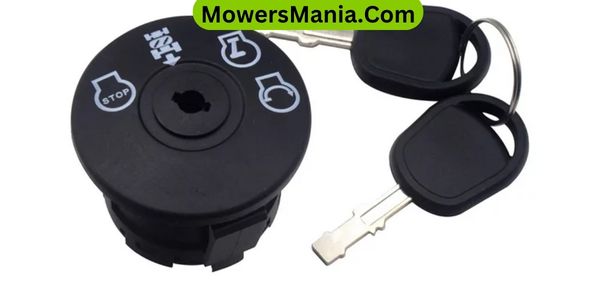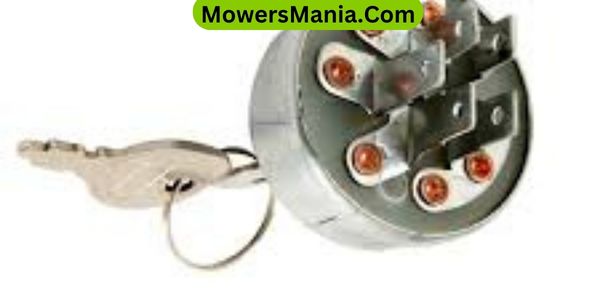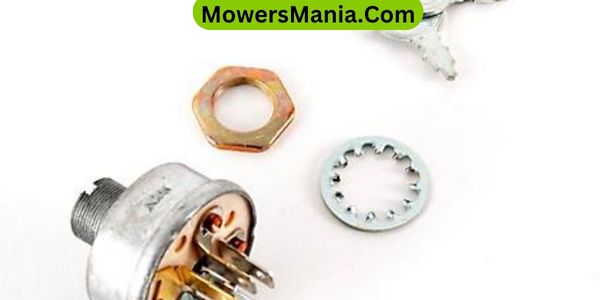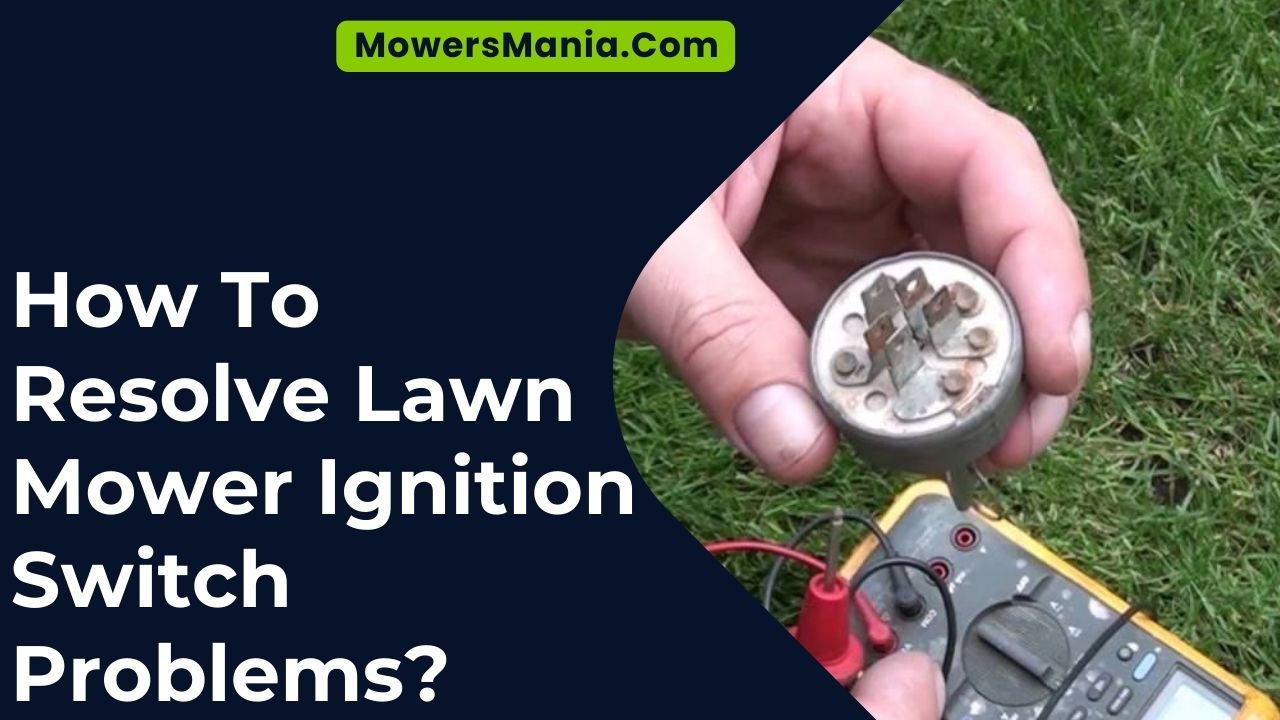If you’re facing frustrating lawn mower ignition switch problems, fret not! Finding a fix is feasible with a few fundamental troubleshooting tips.
From faulty connections to worn-out components, navigating these nuisances necessitates knowledge and patience.

Keep calm and carry on as we delve into the details of diagnosing and remedying your ignition switch snags.
Understanding the Lawn Mower Ignition Switch
To understand the lawn mower ignition switch, you must grasp its function and components. The ignition switch serves as the gateway for the electrical current that starts the engine.
When you turn the key, it activates the starter motor, initiating the lawn mower’s engine. The switch is composed of a key and a tumbler mechanism, which, when turned, completes the circuit and allows the electrical current to flow.
Understanding the components is crucial for diagnosing any issues that may arise. If the switch fails, it can prevent the engine from starting, so it’s essential to ensure that the key turns smoothly and that the connections are secure.
Additionally, the ignition switch often includes other functions, such as a safety interlock system. This system prevents the engine from starting unless certain conditions, such as the blades being disengaged or the operator sitting in the seat, are met. It’s important to be aware of these safety features and their potential impact on the starting process.
Identifying Common Ignition Switch Issues

If your lawn mower’s ignition switch is experiencing issues, recognizing common problems is crucial for troubleshooting and resolving them efficiently.
One common issue is a faulty connection. If the ignition switch fails to start the mower, it could be due to loose or corroded wiring.
Another frequent problem is a worn-out key or keyhole, which can lead to difficulty in turning the key or the key getting stuck.
Additionally, a malfunctioning ignition switch may cause the mower to start but then immediately stall. This could be a sign of internal wear and tear within the switch.
Furthermore, if you notice that the mower starts without the key or the engine continues to run even after removing the key, it indicates a faulty ignition switch that needs to be addressed.
Identifying these common ignition switch issues early on can save you time and money by allowing for prompt repairs or replacements before further damage occurs.
Regular inspection and maintenance of the ignition switch can help prevent these issues and ensure the smooth operation of your lawn mower.
Troubleshooting Steps for Ignition Switch Problems
You frequently encounter ignition switch problems, and troubleshooting them is essential for maintaining your lawn mower’s functionality and performance.
If your mower fails to start, check the ignition switch for any visible damage or loose connections. Begin by inspecting the wiring harness and ensuring that all connections are secure.
If the connections appear intact, use a multimeter to test the continuity of the switch while turning the key. If there’s no continuity, the ignition switch may be faulty and require replacement.
Additionally, check for any corrosion or debris that may be affecting the switch’s functionality. Clean the switch and surrounding area to remove any buildup that could be causing issues.
It’s also important to inspect the key for any signs of wear or damage. A worn-out key may not engage the switch properly, leading to starting problems.
Replacing a Faulty Ignition Switch
Wondering how to replace a faulty ignition switch on your lawn mower?
First, ensure the mower is turned off and the spark plug is disconnected to prevent accidental starts.
Locate the ignition switch, typically situated near the steering wheel or control panel. Remove any covers or panels obstructing access to the switch.
Next, disconnect the wiring harness connected to the ignition switch. Depending on the model, this may involve simply unplugging the connector or removing individual wires. Take note of the wire positions or use a camera to aid reassembly.
Once the wiring is disconnected, loosen the mounting screws or bolts holding the ignition switch in place. Carefully remove the old switch from its position.
Install the new ignition switch by reversing the removal process. Secure it with the mounting screws or bolts, then reconnect the wiring harness. Double-check the connections to ensure they’re secure.
Maintenance Tips to Prevent Future Issues

To prevent future ignition switch problems, regularly inspect the wiring and connections for signs of wear or corrosion. Over time, the wiring and connections can deteriorate due to exposure to the elements and constant use.
Check for any fraying, exposed wires, or rust on the connections. Replace any damaged components to ensure a reliable electrical connection.
Additionally, keep the ignition switch and keyhole clean and free of debris. Dirt and grime can interfere with the proper functioning of the switch, so periodic cleaning is essential.
Furthermore, apply dielectric grease to the connections to protect them from moisture and corrosion. This simple step can prolong the life of the ignition switch and wiring.
Lastly, follow the manufacturer’s recommended maintenance schedule for your lawn mower. Regular tune-ups and inspections can help identify potential issues before they escalate into major problems.
By staying proactive and attentive to the condition of the ignition system, you can prevent future ignition switch issues and keep your lawn mower running smoothly.
Frequently Asked Questions [FAQs]
Can I Use a Universal Ignition Switch as a Replacement for My Specific Lawn Mower Model?
Yes, you can use a universal ignition switch as a replacement for your specific lawn mower model. It’s important to ensure compatibility and follow manufacturer guidelines for proper installation to avoid any issues.
Is It Possible to Repair a Damaged Ignition Switch, or Is Replacement the Only Option?
If your ignition switch is damaged, replacement is usually the best option. Attempting to repair it can be tricky and may not provide a reliable long-term solution. It’s generally more cost-effective and efficient to replace it.
Are There Any Safety Precautions I Should Take When Working on the Ignition Switch of My Lawn Mower?
When working on the ignition switch of your lawn mower, make sure to disconnect the spark plug wire to prevent accidental starts. Use insulated tools and follow manufacturer’s guidelines to ensure safety and prevent electrical hazards.
How Often Should I Clean and Inspect the Ignition Switch to Prevent Future Problems?
You should clean and inspect the ignition switch on your lawn mower at least once a year to prevent future problems. Regular maintenance can help identify issues early and ensure that your mower starts reliably.
Can Ignition Switch Problems Be Related to Other Issues With the Lawn Mower’s Electrical System?
Yes, ignition switch problems can be related to other issues with the lawn mower’s electrical system. When the ignition switch fails, it can affect the entire electrical system, causing issues with starting and running the mower.
Conclusion
Now that you understand how to troubleshoot and resolve lawn mower ignition switch problems, you can get back to mowing your lawn with ease.
Remember to regularly maintain your ignition switch to prevent future issues and ensure your lawn mower runs smoothly.
With these simple steps, you’ll be able to keep your lawn looking great without any ignition switch headaches.



